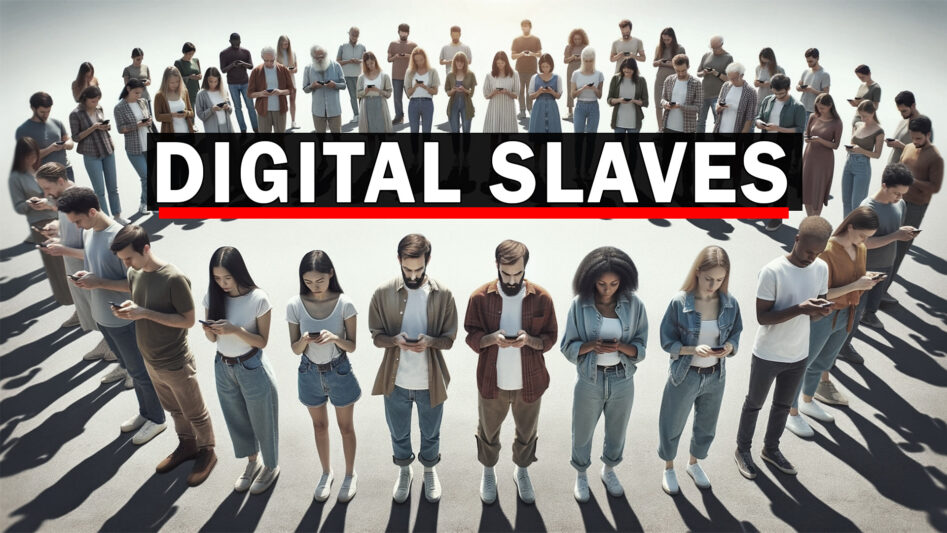Resistance is futile, your life as it has been is over, from this time forward, you will service us.
There is a saying, that you may well know and although not technically correct goes along these lines.
If you put a frog into a pot of boiling water it will jump out, but if you put it in a pot of warm water and gradually heat it up, the frog will just sit there until it’s cooked.
Over the last 20 years or so, the process of digitizing our lives is almost complete. This is the process of moving from the old analog way of doing things to digital formats which creates huge amounts of data about not only us as individuals but as groups and even nations. This data can be moved, shared, copied, sold or stolen by companies, governments, or other individuals, and will record and or control virtually everything you do in your normal day-to-day life in some way or another be that in a minor or major way and often without you knowing or even thinking about it.
Now there’s nothing intrinsically wrong with digital data, it has allowed things to happen that would not have been possible otherwise. The internet, streaming services, social media, the democratization of knowledge, the transformation of industry, the military, travel, banking, healthcare, music, retail, and more recently the use of machine learning and A.I are just going to put this on steroids.
Digital equipment now surrounds us at home and work, from the internet connection you’re using now to the smart meters that monitor your gas and electricity usage to the satellite TV and the smartphone and smartwatch you carry around with you on an almost 24/7 basis.
With the increase of the internet of things in the house, like video door bells, smart fridges, smart speakers, switches, heating controllers, and lighting, the amount of information that is generated about you and the way you live would make the best the best spy agencies of a couple decades ago look inadequate by comparison.
But the smartphone alone is one of the best ways of gathering data which is far more personal than you may think and we are addicted to them, facebook, youtube, Instagram, selfies, phone calls, video calls, you name it and we have a use them and all of this creates a ton of data about us as individuals.
But even when your busy watching cat videos or messaging friends it listens in the background for the trigger words and although Apple and Google say they don’t record anything, some others may well be.
In 2016, it was revealed that an Israeli government backed spyware app called Pegasus had been developed by the private Israeli company NSO Group. This they say is used to fight crime and terrorism but caused uproar because it can take control of a target iOS or Android phone and read text messages, listen to phone calls, collect passwords, track locations and access the target device’s microphone and camera as well as information from apps.
However, Pegasus isn’t a single hacker’s development, it is a commercial product and it’s expensive. For example, a license to cover a single target smartphone in 2016 for one year was about $500,000, so it’s going to be primarily used by governments and the very rich against high-value targets such as terrorists and criminals but has also been used on politicians and government officials, journalists and activists and it is reckoned that over 50,000 licenses have been issued so far.
But if we just look at a normal uninfected smartphone used by an everyday person it can still track your location to within a meter or so, it can see how active you are, how much you walk, and how fast.
If you wear a smartwatch that links to your smartphone and depending upon the model used, it can track your heart rate and any irregularities such as Atrial fibrillation and Sleep apnea, stress levels, temperature, blood oxygen levels, show when you sleep, for how long and how well.
Researchers in Canada and China have developed methods using Deep learning to detect blood pressure issues from selfies taken with the forward-facing camera by detecting changes in the tiny subsurface blood vessels on your face.
This can be more than your doctor will find during a routine checkup, though when your doctor checks you the results are private, whereas when you use an app to track these for your own purposes, you have little to no idea where that data may end up, now or in the future.
This is concerning because in the US and other countries where insurance-based health services exist, the depth of data captured over long periods could be used to base the type of health coverage available, pricing, and claims payouts.
There are strict guidelines about how the data should be handled but as we know, data leaks and just downright ignoring of the rules can happen when big money is involved.
Another area for data gathering is in your car and with new cars becoming ever more connected the range of tracking your behaviour is expanded even more so.
In the posh seaside resort of bed-di-how-choo Beidaihe, China in 2022, Tesla cars were banned from the area for two months while the annual Chinese communist party retreat was ongoing. The CCP are well aware that the cameras on a Tesla are continuously recording data, which they fear could get sent back to the US.
Telsa’s are the most connected cars with data being sent back to Tesla on a whole range of things. Now, this is done by every new production car sold and amounts to 100’s of petabytes of data per year that is meant to be anonymized. However, in court documents for fatal car crashes in the US and Europe, it has been shown that this isn’t always the case, as Telsa has defended itself with data showing how the car was being days, weeks or months before the crash. If this was anonymous as they claim they should not be able to link the data to the car and driver.
Like many new cars, Telsa’s has a Black box, an EDR or Event Data Recorder to record speed, acceleration, brake use, steering input, automatic brake and stability controls for about 5 seconds, before, during, and after a crash.
But Telsa’s also create so called “gateway log” files which record seatbelt, Autopilot, cruise-control settings, and whether drivers had their hands on the steering wheel, about 5 times every second.
This is stored on an SD card in the car’s Media Control Unit and periodically uploaded to Tesla when it has a Wi-Fi connection. Because they also draw in data from the cars CAN bus system, they can include the VIN or vehicle identification number although that data should be filtered out.
Many new cars include cameras to watch the driver and alert them if they appear to be losing concentration or falling asleep at the wheel, again this could be recorded.
In April 2023, Reuters reported that between 2019 and 2023 groups of Telsa workers had privately shared images and videos recorded by Tesla cars of accidents and from when the car is in Sentry mode, something which is said to be only available to the owner of the car via a USB stick.
Video and images were also captured as part of the ongoing A.I deep learning for the autopilot system. Here, hundreds of people working first for an African sub-contractor, then when that was found to be of not a high enough quality, the work was moved to the US and were tasked with manually labelling things that were recorded, like street signs, people, animals, other cars etc so the autopilot could better identify them in the future.
In all these, there is meant to be no identifying information to link the images to the car or driver but there have been instances of very unique scenes, objects or landmarks being captured that could place the car at a particular time and location.
Now, so far we have spoken about using technology that you interact with on a daily basis but retail and social media sites collect huge amounts of data and they know exactly who you are because you tell them in your profile and you also tell them your likes, dislikes, hobbies, music, and biases in your posts, photos, videos etc.
They also know who your friends are, where you live, how often you communicate with them, and exactly what you say, and all this is given completely freely by you to them.
Even though you might not have said what your views on a particular subject might be, by tracking what you watch, who you friend, and what you write, lots of extra information can be assumed and stored alongside it.
Early on Mark Zuckerburg realized that data would become incredibly valuable but it wasn’t until Sheryl Sandberg joined the then Facebook and figured that the large amount of data known about every person on the platform could be used to create highly targeted and highly profitable advertising.
Again, much of this is meant to be kept private but the Cambridge Analytica scandal showed that data held on people’s assumed political leanings could be used along with micro-targeting to influence voters in elections.
So now your private data is being used by others to try and influence your voting habits. When applied to millions of people in whatever country, it can have a noticeable effect on the outcome, which can have very real ramifications outside of the data centers of Facebook, and from what seems like small innocuous pieces data given freely in exchange connecting and chatting with friends.
So Now anyone, from any country with deep enough pockets can buy highly targeted adverts to try and sway people’s opinons using their own data, the tail is well and truly wagging the dog.
In 2016 in his book “The Industries of the Future” Alec Ross suggested that companies trade some 75,000 data points on each American consumer, which by now is probably a gross underestimate.
It’s almost a running joke now that you only need to enter a search phrase about a product or service into almost any search engine, and from that moment you will be seeing adverts popping up all over the place that are related to that search phrase.
It just goes to show just how far things have come in the last 20 odd years and how many of us have just sat in the pot like the frog slowing cooking so long as we get our free fix of facebook, Youtube, Instagram, twitter, Tiktok, flickr, snapchat, reddit, whatsapp and the rest.
Over that last 20 odd years, your private data and big tech companies have quietly changed the world and now control your life by knowing more about you than you probably do. In this video we see how our irresistible urge to own the latest phones, gadgets, and tech has given the mega-corporations not only the power but the money too.

